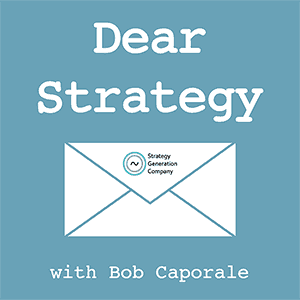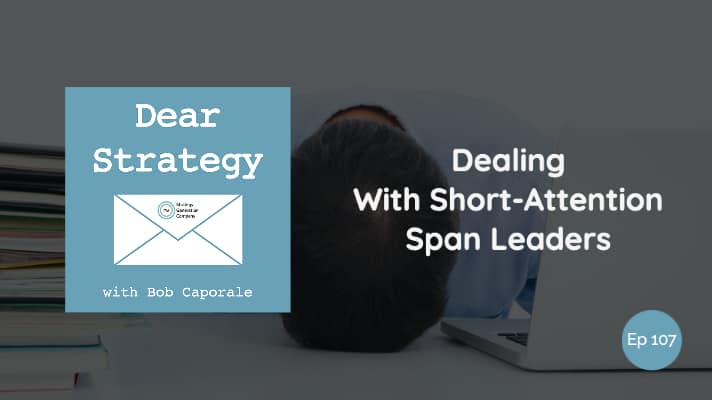On this episode of Dear Strategy, we answer the following question…
Dear Strategy:
“How do I present my strategy to a leader who has a VERY short attention span?”
In the hope that this post will be appealing to some of the leaders with those short-attention spans in question, I am going to keep my answer as succinct as possible! So here it is…
When presenting to any audience, always remember that the burden of conveyance is borne by the presenter, not by the audience. In other words, it’s up to you to get your message across – and that means you need to know your audience and adapt your communication style to their specific needs. I know that, as a presenter, that concept can be a little bit challenging to get your head around sometimes. But it just happens to be the way that it is.
Think of it like this…
If a book makes no sense to someone, it’s usually not because it’s poorly read; it’s because it’s poorly written.
If a movie doesn’t connect, it’s not because it was poorly watched, it’s because it was poorly produced.
If a meal doesn’t taste good, it’s not because it was poorly eaten, it’s because it was poorly prepared.
The point is, it’s up to the deliverer to make sure that the customers get their packages. And if they don’t, then it’s the deliverer’s job to find a way that they do.
“It’s up to the deliverer to make sure that the customers get their packages. And if they don’t, then it’s the deliverer’s job to find a way that they do.”
So, with the accountability now pointed in the right direction, let’s talk about how exactly you can work toward getting your messages across, especially with regards to business presentations:
- Be Concise. Always avoid the urge to prove that you’re the smartest person in the room. Remember that true expertise isn’t demonstrated by being able to rattle off a bunch of information; it’s demonstrated by being able to summarize that information in a way that other people can understand. Said differently, your audience is busy, and know-it-alls are just annoying!
- Be Clear. If you want your audience to stay focused on what you’re saying, you need to make sure that what you’re saying is easy for them to follow. A great way to do that is to provide a roadmap that will allow your audience to follow along with your line of thinking without them having to do too much thinking themselves. Repeated agendas, overarching bullet points, and guiding frameworks are all methodologies that you can use to keep bringing your audience back to your storyline and to make sure that they don’t ever get lost along the way.
- Be Personal. Speaking of storylines, it’s super important that your presentation follows a clear story arc that will keep your audience engaged. Like we’ve talked about in many other blog posts, that story arc will generally have an introduction, a problem to be solved, a solution, an implementation of that solution, and some sort of a conclusion. (Click HERE for more information on how you can put this technique into practice). But just as important as telling your story is making sure that your audience can relate to that story in a way that is completely personal to them. So if you’re talking about a light fixture that’s sold to hospitals, don’t just tell the story of the light fixture, tell a story about how that light fixture will save the lives of your audience the next time they find themselves on the wrong side of an operating room. No matter how short people’s attention spans are, when a story becomes about them, they always start to listen much more closely.
So that’s what you can do if you’re presenting to short-attention span leaders. But, if you happen to be one of those short-attention span leaders, I do have one piece of parting advice for you as well (assuming that you’re still reading at this point!) That is… don’t confuse having a short attention span with simply not wanting to listen.
I get it – you have a lot on your plate. But, using a previous analogy, an author can only engage those readers who are actually willing to pick up the book. So, if you consider yourself to be a short-attention span leader, you need to do your part and make every effort to listen to people when they’re speaking to you. I know there are some legitimate reasons why that may not always be possible. But you also can’t lean on the excuse that being a leader allows you the privilege to selectively tune out that which you’re just not in the mood to hear.
Said differently, even though I fully believe that the presenter carries the burden of engaging his or her audience, I also don’t excuse an audience that is simply being rude.
Listen to the podcast episode
Dear Strategy: Episode 107

Are you interested in strategy workshops for your product, marketing, or business managers? If so, please be sure to visit Strategy Generation Company by clicking the link below:
 Bob Caporale is the founder of Strategy Generation Company, the author of Creative Strategy Generation and the host of the Dear Strategy podcast. You can learn more about his work by visiting bobcaporale.com.
Bob Caporale is the founder of Strategy Generation Company, the author of Creative Strategy Generation and the host of the Dear Strategy podcast. You can learn more about his work by visiting bobcaporale.com.







